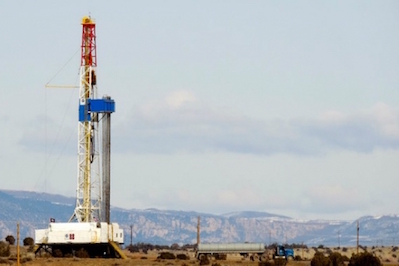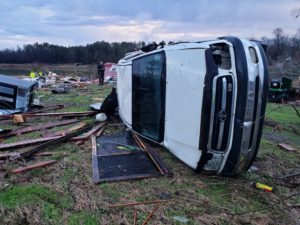Earthquake Rattles Oklahoma Amid Warnings of ‘Inherent’ Fracking Risks
A 5.6-magnitude quake, one of the strongest in Oklahoma's history, shook a seven-state area. And "it could have been prevented," said a leading activist. Saturday's earthquake shows how "inherently dangerous" fracking is, said Wenonah Hauter of Food & Water Watch. (WildEarth Guardians/flickr/cc)
Saturday's earthquake shows how "inherently dangerous" fracking is, said Wenonah Hauter of Food & Water Watch. (WildEarth Guardians/flickr/cc)
By Nadia Prupis / Common Dreams
Saturday’s earthquake shows how “inherently dangerous” fracking is, said Wenonah Hauter of Food & Water Watch. (WildEarth Guardians/flickr/cc)
Oklahoma was hit with a 5.6-magnitude earthquake on Saturday, with reports of tremors felt in six neighboring states—making it one of the strongest quakes in Oklahoma’s history and fueling a growing consensus that the cause lies with wastewater disposal from hydraulic fracturing, or fracking.
CNN reported that the event also rattled Kansas, Arkansas, Missouri, Texas, Nebraska, and Iowa, citing geophysicists with the U.S. Geological Survey (USGS), who said it “occurred as the result of shallow strike-slip faulting.”
The quake struck just after 7:00am local time near Pawnee, followed by four separate incidents of aftershock. No major injuries were reported.
The USGS continued: “Scientific studies have linked the majority of this increased activity to wastewater injection in deep disposal wells in several locations. However, other mechanisms such as fluid withdrawal, enhanced oil recovery, or hydraulic fracturing processes can also result in induced earthquakes.”
In Oklahoma, where earthquakes increased by 50 percent last year as about 1.5 billion barrels of wastewater from oil and gas sites were disposed of underground, the link between fracking and seismic events is well-established.
Tulsa Public Radio wrote in August that the
Oklahoma Geological Survey is embarking on a six-month study of oil and gas injection wells to better understand earthquakes caused by fracking wastewater disposal.
The consensus is wastewater disposal is linked to earthquakes, but the exact mechanisms aren’t known.
Fracking involves injecting chemically infused water at high speeds into shale rock to release the gas or oil that lies beneath it. The controversial extraction method has already been banned in communities around the world, with more and more cities gearing up to oppose it.
For Wenonah Hauter, executive director of the environmental nonprofit Food & Water Watch, Saturday’s event shows how “inherently dangerous” fracking is.
“The 5.6 magnitude earthquake that occurred in Oklahoma and was felt throughout the Midwest this morning threatened countless homes and businesses, and put lives at risk. But it could have been prevented,” Hauter said. “This earthquake, and hundreds of others like it over the last few years, are the direct result of the underground disposal of fracking wastewater.”
“There can’t be fracking without disposing of fracking waste, and there is no safe way to do so. This is just one of many reasons why fracking is inherently dangerous and must be banned,” she said.
Nadia Prupis is a staff writer at Common Dreams.
Your support matters…Independent journalism is under threat and overshadowed by heavily funded mainstream media.
You can help level the playing field. Become a member.
Your tax-deductible contribution keeps us digging beneath the headlines to give you thought-provoking, investigative reporting and analysis that unearths what's really happening- without compromise.
Give today to support our courageous, independent journalists.




You need to be a supporter to comment.
There are currently no responses to this article.
Be the first to respond.